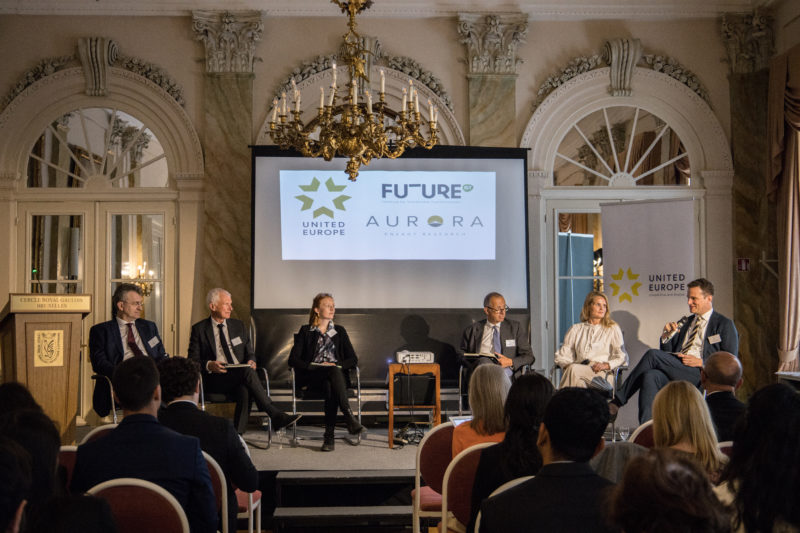On May 31st United Europe in partnership with Aurora Energy Research and Future Institute for Sustainable Transformation organised an Advocacy Seminar on Europe’s Energy Price Crisis at the Cercle Royal Gaulois in Brussels.
What can be done about record-breaking energy prices in the short term, and how can this be aligned with decarbonising our societies in the long term? Europe is facing the Immediate challenge of energy affordability, so how can governments help Europeans cope with bills whilst keeping their industry competitive?
This and more was being discussed with the panelists from Europe’s energy stakeholders who took the stage to point to the consequences they are facing in the current setting. Among the panelists were Torbjørg Klara Fossum, Vice President at Equinor, Simone Mori, Head of Europe at Enel Group, Marc-Oliver Arnold, Plant Director at GMH Gruppe, Johanna Schiele, Policy Officer at DG CLIMA, European Commission and Sir Philip Lowe, Partner at Oxera. The discussion was moderated by our co-organizer Hanns Koenig, Head of Commissioned Projects, Central Europe, at Aurora Energy Research.
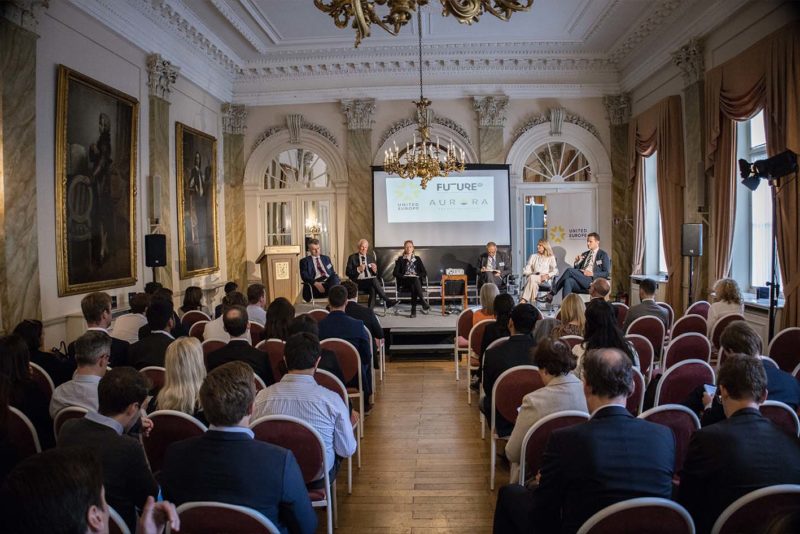
Hereunder you will find key points made by the panelists about Europe’s Energy Price Crisis:
Sir Philip Lowe, Partner at Oxera Consulting, opened the panel by setting the scene: Whilst we are seeing a sudden and massive rise in energy prices around the world and particularly in Europe, the price crisis has been a long time in the making: Investment in fossil fuel extraction had been low for years, due to low prices, amplified by Covid. Rapidly recovering demand after Covid, especially in Asia, as India and China are switching from coal to gas, has led to global market tightness, amplified by Russia exerting pressure on gas markets in Europe.
Simone Mori, Head of Europe at Enel stated that not looking at the root cause but rather looking at the outcome to solve the energy price crisis is the wrong approach – a philosophical mistake. The European customer falls victim to the phenomenon of double marginality, where the power price is predominantly set by the gas price, which is however a complex term and hard to explain to the public. According to Mori, a new market model for the power sector is needed by looking at energy, decarbonization, flexibility, and security of supply.
Torbjørg Klara Fossum, Vice President at Equinor, expressed concern about the three major crises Europe is facing: war in Europe, energy prices and climate change. Net-zero in 2050 is a massive task looking at the scale whilst managing three crises at the same time: “We have to use a broad toolbox” she said. The gap of energy generated with renewables vs fossil fuels is huge: one year of production from an offshore wind farm generates as much energy as is contained in one ship with fossil fuels so it’s a massive challenge to meet Europe’s energy demand: “Decarbonization is key and carbon capture is the solution for industry. Unfortunately, we still see a commercial gap between emission and carbon capture and we have to work towards closing that gap.”, Fossum concluded in her opening statement.
Marc-Oliver Arnold, Plant Director at GMH Group, represents one of Germany’s largest electricity consumers. “Steel making in Germany is a pleasure, but it is also pressure. We are defiant with our processes and we believe green steel production is the future. Steel as a construction material is a strategic commodity and we need it in an environmentally friendly way. We are facing immense problems turning our electricity consumption green, not only green washed but really green.” he said. The availability of sufficient quantities of green electricity is still problematic in Europe.
Johanna Schiele from the European Commission represents a new fund helping build a sustainable backbone for Europe’s industry, the Innovation Fund. She argued that short-term measures which are currently being discussed to replace Russian gas are competing for money with long-term initiatives that are urgently needed for the green transition: “I am a little bit pessimistic about the approach to the energy price crisis in Europe. The dilemma of the Innovation Fund is that we want to fund measures of excellence needed in say 10 years’ time, but we are also under a lot of pressure to act in the short term.” she concluded.
You can find a recording of the panel discussion here.
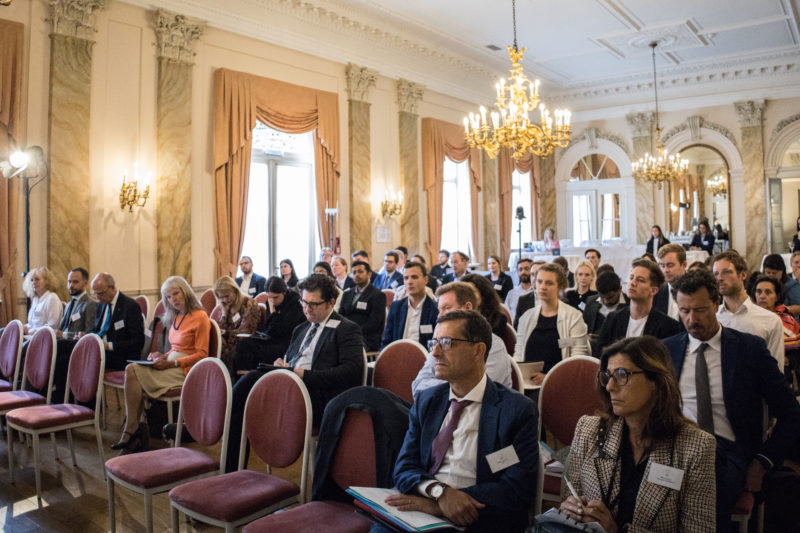
Following the panel discussion Jannis Röthemeier, Executive Director at Future Institute for Sustainable Transformation, led a workshop for 25 young professionals where the outcome of the panel discussion has been addressed: Major challenges to the sustainable transformation have been identified, and the group ideated (and rated) solutions around the approach to sustainable action.
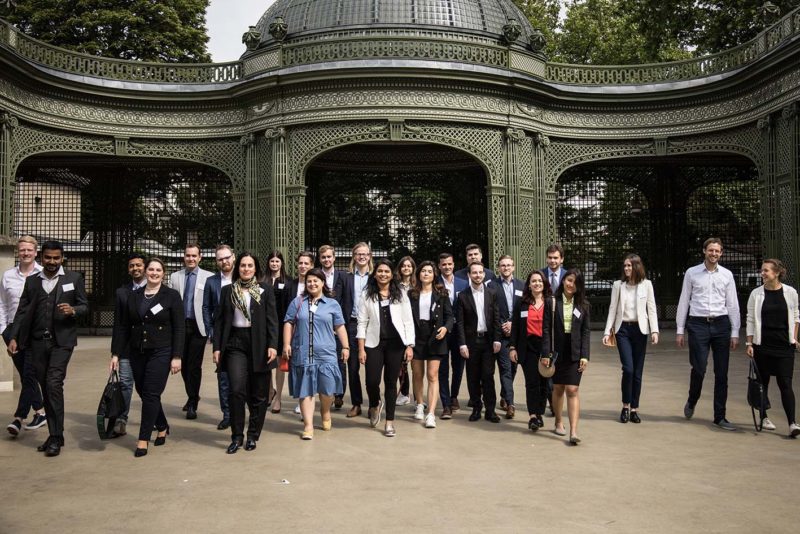 Hereunder you will find three ways to create a long-lasting impact:
Hereunder you will find three ways to create a long-lasting impact:
1. Reduce negative impact (such as CO2 emissions or waste) | FOOTPRINT
2. Increase positive impact (such as sustainable infrastructure or education opportunities) | HANDPRINT
3. Create transformational impact (such as incentives or positive narratives) | HEARTPRINT
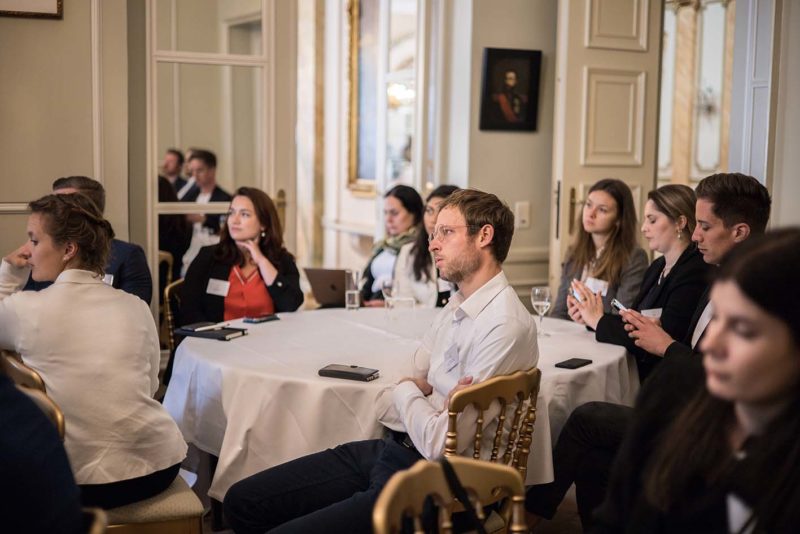
We would like to thank our co-organisers, Aurora Energy Research and Future Institute for sustainable Transformation, panelists, participants, guests on-site and online especially our members who have made this event possible. Over 70 guests were listening on-site and online alongside 25 young professionals who have been invited from all across Europe.



